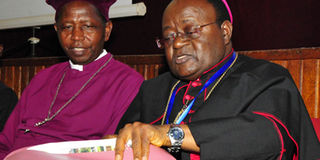Don’t gag Opposition, clergy tell government

Church of Uganda Archbishop Stanley Ntagali (L) and Kampala Diocese Archbishop Cyprian Kizito Lwanga (R) address journalists at Pope Paul Memorial Centre recenty. PHOTO by STEPHEN WANDERA
What you need to know:
Call for peace. Under the Uganda Joint Christian Council, the clergy called for dialogue among the different political groups in the country.
Kampala. Religious leaders have told government to stop persecuting or muzzling Opposition leaders who are demanding electoral reforms.
The clergy, speaking on the sidelines of their 2015 general assembly of the Uganda Joint Christian Council (UJCC) held in Kampala on Monday, appealed for dialogue among the different political forces in the country. They also issued a pastoral letter which will guide sermons on electoral reforms.
“The assembly expressed concern about attempts being made by those in authority to muzzle the voice of Opposition political parties through interference with their rights to organise and freely canvass for support,” Kampala Diocese Archbishop Cyprian Kizito Lwanga said.
Other religious leaders present at the briefing included Church of Uganda Archbishop Stanely Natagali, and the Rev Charalambos Mutalangwe of the Orthodox Church.
The leaders raised concerns about the slow pace of the ongoing constitution amendment process. The Parliamentary Committee on Legal Affairs is currently scrutinising the Constitutional Amendment Bill, 2015, submitted by government.
“The assembly noted with concern that the proposals by the Opposition political parties and civil society organisations, submitted to the competent authorities, were not incorporated in the Bill. In that regard, the assembly urges the government to take a fresh look at issues pertaining to electoral reforms,” the Rev Mutalangwe said.
The assembly appealed to the government to take the necessary steps for levelling the ground for free and fair elections. “Any attempt to manipulate the electoral process would be an act of injustice to the people of Uganda,” Archbishop Ntagali said.
The leaders called for dialogue and expressed willingness to support it. “In particular, we stress the importance of dialogue between leaders of NRM and those of the Opposition parties within the legal framework provided under the Political Parties and Organisations Act, 2005, so that contentious issues can be resolved amicably.”
The assembly held under the theme “Make every effort to preserve the unity of the spirit through the bond of peace” attracted more than 120 delegates who consisted of the clergy, heads of laity, women and the youth from all the member dioceses of UJCC with the 17 operational regions of the council.
In response to the Clergy, Kiboga District Woman MP Ruth Nankabirwa who is also the government chief whip, said: “I for one would like a smooth process but it takes two to tango. Everybody should be respectful of human rights and freedoms. As far as I am concerned government has been open, for example, we are out of time but the committee on Legal and Parliamentary Affairs is still receiving views from the public and other stakeholders.”
While addressing the conference, Dr Badru Kiggundu, the Electoral Commission chairman, appealed to UJCC to mobilise Ugandans to participate in the display of the voters’ register. “You have a wide access to the general public through your outreaches. Engage in various sensitisation programmes designed at local and national levels….this should be impartially done.”
Other concerns
•Shortage of staff in hospitals and health centres which leads to a struggle to cope up with huge number of patients.
•Difficulty in making communication and movement of goods and services due to poor road networks characterised by poor maintenance, broken bridges and potholes.
•Unsatisfactory human rights situation in the country due to the high rates of gender based violence characterised by criminal acts such as rape and defilement
•The freedom of expression and assembly remains a challenge in our country.
Inability of the authorities to take decisive actions (political, judicial or administrative) against perpetrators of grand corruption.


